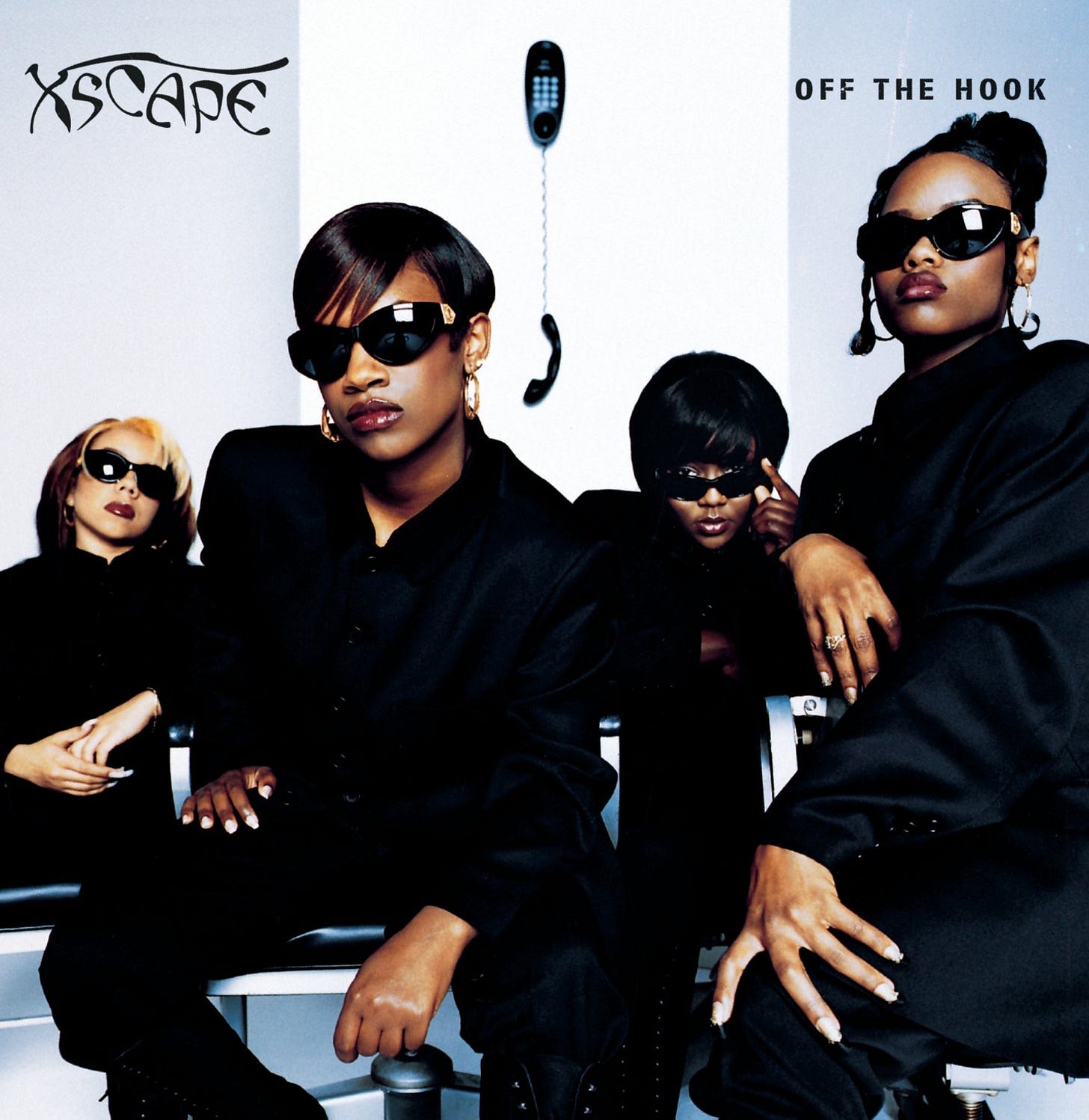Anniversaries: Off the Hook by Xscape
Xscape were never the most choreographed or market-blitzed quartet, yet Off the Hook shows four singers willing to cede spotlight to one another for the sake of blend.
Revisiting Off the Hook nearly three decades after its arrival, the album still greets us with College Park chatter and an operator’s clipped instructions, then slips into a splash of hi-hat and snare that feels both neighborly and assertive. Jermaine Dupri’s production values—heavy on clean kicks, rubbery bass, and short bursts of keyboard—outline Xscape as a quartet eager to prove that their 1993 debut was no fluke. The mix is warmer than memory might suggest, with guitars and string pads tucked just behind the voices, granting LaTocha, Tamika, Kandi, and Tiny room to lean into each syllable. Even before the first full song, the tone is set with confidence, a conversational tone, and an unapologetic grit.
“Do Your Thang” plays like a self-contained manifesto. Kandi opens by coaxing action—“If the music makes you move, and you can feel the groove, then groove on”—over a loop that borrows melancholy from Isaac Hayes yet still bounces forward. The track’s brevity leaves no wasted bars; Dupri fades the beat just as the harmonies start layering in jazzy thirds, a decision that teases rather than oversells. Heard today, its under-two-minute runtime feels almost prophetic, anticipating the streaming era’s taste for compact statements without losing the lived-in Southern swing of mid-‘90s Atlanta.
“Feels So Good” follows and wastes no time pivoting from manifesto to flirtation. The Teddy Pendergrass interpolation is subtle enough to sidestep nostalgia overload, and the snare pattern, bright but not brittle, keeps the groove crisp. In 2025, the single lands as a reliable mid-tempo charmer, less adrenaline rush, more steady glide. “Hard to Say Goodbye” steps in like a deep breath, but the deficiency heightens the bittersweet aftertaste, especially when the harmonies slide into a soft call-and-response that ends before any grand resolution can form. “Can’t Hang” could have derailed the continuity by importing outside swagger, yet MC Lyte’s verse drops in seamlessly. The track still bumps alongside mid-’90s competition like SWV’s “Anything” remix or TLC’s “Kick Your Game,” yet it never feels like imitation.
The album’s commercial centerpiece, “Who Can I Run To,” remains a masterclass in restraint. Where The Jones Girls’ original draped its yearning in lush orchestration, Xscape relies on carefully balanced triads, letting LaTocha stretch her vowels until the question at the heart of the hook feels less rhetorical than confessional. The updated drum program sits lower in the mix than on the single cuts, which draws the ear toward harmonic detail: the tight thirds in the pre-chorus, the held notes that bloom into quiet vibrato. Hearing it now, the cover sounds neither dated nor overly glossy; instead, it showcases a group comfortable enough to pare an anthem down to breath and blended timbre.
A brief skit bridges the gap to “Do You Want To,” often championed as the set’s hidden jewel. Its six-bar intro loops a slinky guitar lick that samples Maze’s “Southern Girl,” then slides into Tiny’s velvety lead. The writing balances desire and hesitation, asking not “will you” but “do you want to,” a distinction that underscores the album’s recurring negotiation between agency and vulnerability. Harmonies swell during the final chorus, with Tamika adding gospel-leaning ad-libs that raise the emotional temperature without tipping into melodrama. In the streaming era, the song serves as a precursor to the slowed-down sensuality favored by contemporary acts like Victoria Monét, demonstrating that precision often outlasts maximalism.
“Do Like Lovers Do” and “Work Me Slow” share a thematic DNA, characterized by slow-burn intimacy, key chord changes, and whispered backgrounds, but they avoid redundancy through their vocal arrangements. LaTocha commands the first with a wide vibrato that stretches each syllable; Kandi handles the second, her slightly raspy tone cutting through Simmons’s glassy synth pads. Dupri leans on rim-shot snares and muted bass, emphasizing pocket over polish, which keeps both tracks grounded in Southern soul rather than drifting toward quiet-storm slickness. The pair still lands as cohesive, not repetitive, thanks to those textural shifts. Organized Noize step in for “Keep It on the Real,” swapping crisp hi-hats for swamp-thick drums and rolling bass that foreshadow the production collective’s later work with TLC and OutKast. As finales go, the song feels more open-ended than conclusive, yet that fits an album rooted in candid conversation.
Where many mid-‘90s R&B sets padded runtimes with filler, Off the Hook keeps sidesteps short and melodies center-stage. Its production choices (judicious reverb, unfussy keyboard patches, live bass that never clutters) age better than flashier peers and reveal a group deeply aware of its strengths. Against its competition—albums by En Vogue, TLC, Jade, and Brownstone—the record holds its own because it stakes identity on interplay rather than polish alone. Xscape were never the most choreographed or market-blitzed quartet, yet Off the Hook shows four singers willing to cede spotlight to one another for the sake of blend. That decision pays dividends in longevity: harmonies still feel lived-in, the writing remains direct, and the production avoids the over-compressed sheen that dates many contemporaries.
As a sophomore effort, it neither reinvents the genre nor collapses under expectation; instead, it solidifies early legacy with craft, candor, and a sense of communal swing that modern R&B could still learn from.


